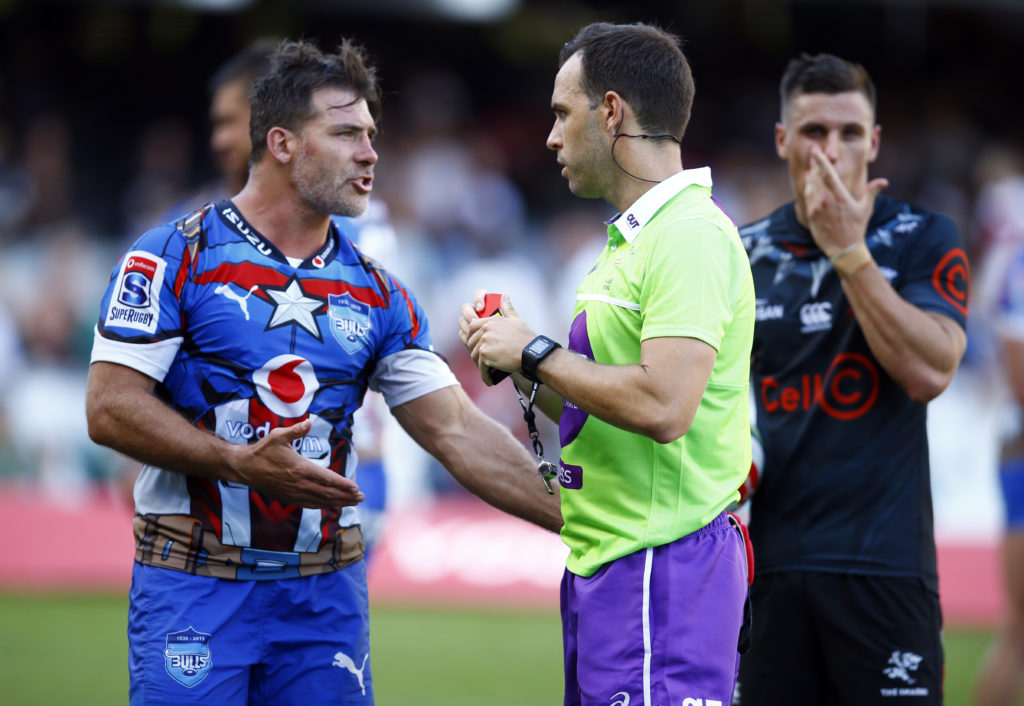Mariette Adams and Dylan Jack debate whether the red-card replacement law trial will have a positive impact during the upcoming Rainbow Cup derbies.
Adams says Yes
Following in the footsteps Super Rugby Aus and Super Rugby Aotearoa, the European Rainbow Cup and SA Rainbow Cup will implement various new law trials in their 2021 tournaments.
The one currently generating the most debate is the red-card replacement law. This ‘radical’ new law will allow teams to return to their full complement 20 minutes after a player had been shown a red card.
This law seems fair – and not only because anyone who received a red card is all but sure to be suspended subsequently.
Dismissal from the field punishes the team as well as the individual player and, if the red card is given early in the match, the punishment for the team is severe.
Case in point being the Lions’ Super Rugby final loss to the Crusaders in 2017 when Kwagga Smith was controversially sent off in the first half. In that game, the Lions put up a spirited fight in the last 20 minutes and fell just eight points short on the scoreboard.
Then the Lions were left wondering what if. Countless other teams have left wondering what if, too.
Often the actual issuing of red cards is controversial mainly because of match officials’ varying interpretations of the laws.
Of course, there are counter-arguments to this 20-minute replacement law. For example: it doesn’t offer the opposing team a big enough advantage or it doesn’t discourage foul play at all.
To address those issues, perhaps lawmakers can add a by-law which deems certain acts of foul play high-level offences and players guilty of those should not be replaced.
But 20 minutes is a long time in rugby – a quarter of a match – to be a man short for accidental, unintentional and particularly two yellow-card offences (eg. Bismarck du Plessis against the All Blacks in 2013).
Jack says No
This may come off as hypocritical, given that I have previously been in favour of some sort of red-card replacement law allowing a team to bring on a substitute for a red-carded player.
However, having seen the law trial in action and fully considering the benefits and drawbacks, I don’t think it will have a positive impact, especially in terms of making the game safer.
The major issue is that allowing a team to bring on a replacement for a red-carded player effectively lessens the impact of the red card as a punishment and deterrent for foul play.
Granted, there is the ‘fair contest’ view that it keeps games at 15 vs 15 (unless the offending player is red-carded in the 60th minute). This certainly would have been handy for the Lions in the 2017 Super Rugby final, when they had to play with 14 men for 42 minutes against a Crusaders team they would have needed their full complement to beat.
However, this looks at only the short-term impact that a red card could have on any single rugby match, ignoring the longer-term impact it has as a deterrent.
Red cards are there to ensure players stop reckless behaviour that endangers their opponents on the field. The fear of not only being removed from the field for the rest of the match, but also forcing your team to play with a man down is an important factor here.
Removing this fear would only result in more acts of foul play: intentional or otherwise.
In Super Rugby AU, where the new law is being trialled for the second year running, there have been seven foul-play red cards issued in this year’s regular season compared with zero last year. The answer to this perhaps lies in the accuracy of the officiating, but it could also be an indicator that the trial just isn’t enough of a deterrent for dangerous tackles or ruck entries.
? Isi Naisarani pic.twitter.com/Fffa8ge1P6
— Ultimate Rugby (@ultimaterugby) April 24, 2021
If World Rugby wants some sort of intervention here, perhaps it is better to introduce an intermediary – an orange card, if you will. That could be used in incidents which are more unintentional, such as what happened to Kwagga Smith in 2017.
Photo: Gallo Images





